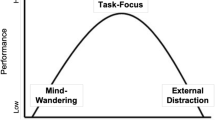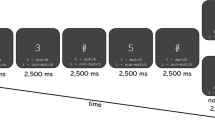Abstract
Many theories argue that goal striving is more intense when people have optimistic expectancies for achieving the goal and when attention is self-focused. Brehm’s motivational intensity theory, however, predicts that the intensity of motivation is only as high as necessary, so people will try harder for difficult tasks than for easy tasks, all else equal. The present experiment compared these two approaches by manipulating two levels of self-focused attention (low and high self-awareness, via a mirror) and two levels of task difficulty (easy and difficult). Effort was assessed as cardiovascular reactivity, particularly change in systolic blood pressure. Neither high self-focus nor an easy task per se caused increased effort; instead, high self-focus significantly increased systolic reactivity when the task was difficult. Effort was thus higher despite less optimistic goal expectancies, a finding that is predicted by Brehm’s motivational intensity theory but not by traditional self-regulation models.



Similar content being viewed by others
References
Al’Absi, M., Bongard, S., Buchanan, T., Pincomb, G. A., Licinio, J., & Lovallo, W. R. (1997). Cardiovascular and neuroendocrine adjustment to public speaking and mental arithmetic stressors. Psychophysiology, 34, 266–275.
Bandura, A. (1997). Self-efficacy: The exercise of control. New York: Freeman.
Berntson, G. G., Cacioppo, J. T., & Quigley, K. S. (1993). Cardiac psychophysiology and autonomic space in humans: Empirical perspectives and conceptual implications. Psychological Bulletin, 114, 296–322.
Brehm, J. W., & Self, E. (1989). The intensity of motivation. Annual Review of Psychology, 40, 109–131.
Brehm, J. W., Wright, R. A., Solomon, S., Silka, L., & Greenberg, J. (1983). Perceived difficulty, energization, and the magnitude of goal valence. Journal of Experimental Social Psychology, 19, 21–48.
Brickenkamp, R., & Zillmer, E. (1998). d2 test of attention. Seattle: Hogrefe & Huber.
Brinkmann, K., & Gendolla, G. H. E. (2007). Dysphoria and mobilization of mental effort: Effects on cardiovascular reactivity. Motivation and Emotion, 31, 71–82.
Brownley, K. A., Hurwitz, B. E., & Schneiderman, N. (2000). Cardiovascular psychophysiology. In J. T. Cacioppo, L. G. Tassinary, & G. G. Berntson (Eds.), Handbook of psychophysiology (pp. 224–264). New York: Cambridge University Press.
Burgio, K. L., Merluzzi, T. V., & Pryor, J. B. (1986). Effects of performance expectancy and self-focused attention on social interaction. Journal of Personality and Social Psychology, 50, 1216–1221.
Carver, C. S., Blaney, P. H., & Scheier, M. F. (1979a). Focus of attention, chronic expectancy, and responses to a feared stimulus. Journal of Personality and Social Psychology, 37, 1186–1195.
Carver, C. S., Blaney, P. H., & Scheier, M. F. (1979b). Reassertion and giving up: The interactive role of self-directed attention and outcome expectancy. Journal of Personality and Social Psychology, 37, 1859–1870.
Carver, C. S., & Scheier, M. F. (1978). Self-focusing effects of dispositional self-consciousness, mirror presence, and audience presence. Journal of Personality and Social Psychology, 36, 324–332.
Carver, C. S., & Scheier, M. F. (1981). Attention and self-regulation. New York: Springer.
Carver, C. S., & Scheier, M. F. (1998). On the self-regulation of behavior. New York: Cambridge University Press.
Duval, T. S., Duval, V. H., & Mulilis, J. P. (1992). Effects of self-focus, discrepancy between self and standard, and outcome expectancy favorability on the tendency to match self to standard or to withdraw. Journal of Personality and Social Psychology, 62, 340–348.
Duval, T. S., & Lalwani, N. (1999). Objective self-awareness and causal attributions for self-standard discrepancies: Changing self or changing standards of correctness. Personality and Social Psychology Bulletin, 25, 1220–1229.
Duval, T. S., & Silvia, P. J. (2001). Self-awareness and causal attribution: A dual systems theory. Boston: Kluwer Academic Publishers.
Duval, T. S., & Silvia, P. J. (2002). Self-awareness, probability of improvement, and the self-serving bias. Journal of Personality and Social Psychology, 82, 49–61.
Duval, T. S., & Wicklund, R. A. (1972). A theory of objective self awareness. New York: Academic Press.
Eubanks, L., Wright, R. A., & Williams, B. J. (2002). Reward influence on the heart: Cardiovascular response as a function of incentive value at five levels of task demand. Motivation and Emotion, 26, 139–152.
Gendolla, G. H. E., & Krüsken, J. (2002). The joint effect of informational mood impact and performance-contingent incentive on effort-related cardiovascular response. Journal of Personality and Social Psychology, 83, 271–283.
Gendolla, G. H. E., & Richter, M. (2005). Ego-involvement and effort: Cardiovascular, electrodermal, and achievement effects. Psychophysiology, 42, 595–603.
Gendolla, G. H. E., & Richter, M. (2006). Cardiovascular reactivity during performance under social observation: The moderating role of task difficulty. International Journal of Psychophysiology, 62, 185–192.
Gendolla, G. H. E., & Richter, M. (2010). Effort mobilization when the self is involved: Some lessons from the cardiovascular system. Review of General Psychology, 14, 212–226.
Gendolla, G. H. E., Richter, M., & Silvia, P. J. (2008). Self-focus and task difficulty effects on cardiovascular reactivity. Psychophysiology, 45, 653–662.
Iani, C., Gopher, D., & Lavie, P. (2004). Effects of task difficulty and invested mental effort on peripheral vasoconstriction. Psychophysiology, 41, 789–798.
Levick, J. R. (2003). An introduction to cardiovascular physiology (4th ed.). New York: Oxford University Press.
Liebling, B. A., & Shaver, P. (1973). Evaluation, self-awareness, and task performance. Journal of Experimental Social Psychology, 9, 297–306.
Llabre, M. M., Spitzer, S. B., Saab, P. G., Ironson, G. H., & Schneiderman, N. (1991). The reliability and specificity of delta versus residualized change as measure of cardiovascular reactivity to behavioral challenges. Psychophysiology, 28, 701–711.
McDonald, P. J. (1980). Reactions to objective self-awareness. Journal of Research in Personality, 14, 250–260.
Nolte, R. N., Wright, R. A., Turner, C., & Contrada, R. J. (2008). Reported fatigue, difficulty, and cardiovascular response to a memory challenge. International Journal of Psychophysiology, 69, 1–8.
Obrist, P. A. (1981). Cardiovascular psychophysiology: A perspective. New York: Plenum.
Papillo, J. F., & Shapiro, D. (1990). The cardiovascular system. In J. T. Cacioppo & L. G. Tassinary (Eds.), Principles of psychophysiology (pp. 465–512). New York: Cambridge University Press.
Phillips, A. G., & Silvia, P. J. (2005). Self-awareness and the emotional consequences of self-discrepancies. Personality and Social Psychology Bulletin, 31, 703–713.
Richter, M., Friedrich, A., & Gendolla, G. H. E. (2008). Task difficulty effects on cardiac activity. Psychophysiology, 45, 869–875.
Richter, M., & Gendolla, G. H. E. (2009). The heart contracts to reward: Monetary incentives and pre-ejection period. Psychophysiology, 46, 451–457.
Rosnow, R. L., & Rosenthal, R. (1989). Statistical procedures and the justification of knowledge in psychological science. American Psychologist, 44, 1276–1284.
Scheier, M. F., Carver, C. S., & Gibbons, F. X. (1979). Self-directed attention, awareness of bodily states, and suggestibility. Journal of Personality and Social Psychology, 37, 1576–1588.
Silvia, P. J., & Duval, T. S. (2001a). Objective self-awareness theory: Recent progress and enduring problems. Personality and Social Psychology Review, 5, 230–241.
Silvia, P. J., & Duval, T. S. (2001b). Predicting the interpersonal targets of self-serving attributions. Journal of Experimental Social Psychology, 37, 333–340.
Wicklund, R. A., & Duval, T. S. (1971). Opinion change and performance facilitation as a result of objective self-awareness. Journal of Experimental Social Psychology, 7, 319–342.
Wolf, H. K., Tuomiletho, J., Kuulasmaa, K., Domarkiene, S., Cepaitis, Z., Molarius, A., et al. (1997). Blood pressure levels in the 41 populations of the WHO MONICA project. Journal of Human Hypertension, 11, 733–742.
Wright, R. A. (1996). Brehm’s theory of motivation as a model of effort and cardiovascular response. In P. M. Gollwitzer & J. A. Bargh (Eds.), The psychology of action: Linking cognition and motivation to behavior (pp. 424–453). New York: Guilford.
Wright, R. A., Junious, T. R., Neal, C., Avello, A., Graham, C., Herrmann, L., et al. (2007). Mental fatigue influence on effort-related cardiovascular response: Difficulty effects and extension across cognitive performance domains. Motivation and Emotion, 31, 219–231.
Wright, R. A., Killebrew, K., & Pimpalapure, D. (2002). Cardiovascular incentive effects where a challenge is unfixed: Demonstrations involving social evaluation, evaluator status, and monetary reward. Psychophysiology, 39, 188–197.
Wright, R. A., & Kirby, L. D. (2001). Effort determination of cardiovascular response: An integrative analysis with applications in social psychology. In M. P. Zanna (Ed.), Advances in experimental social psychology (Vol. 33, pp. 255–307). New York: Academic Press.
Wright, R. A., Shaw, L. L., & Jones, C. R. (1990). Task demand and cardiovascular response magnitude: Further evidence of the mediating role of success importance. Journal of Personality and Social Psychology, 59, 1250–1260.
Wright, R. A., Tunstall, A. M., Williams, B. J., Goodwin, J. S., & Harmon-Jones, E. (1995). Social evaluation and cardiovascular response: An active coping approach. Journal of Personality and Social Psychology, 69, 530–543.
Wright, R. A., Wadley, V. G., Pharr, R. P., & Butler, M. (1994). Interactive influence of self-reported ability and avoidant task demand on anticipatory cardiovascular responsivity. Journal of Research in Personality, 28, 68–86.
Acknowledgments
We thank Emily Maschauer for assisting with data collection.
Author information
Authors and Affiliations
Corresponding author
Rights and permissions
About this article
Cite this article
Silvia, P.J., McCord, D.M. & Gendolla, G.H.E. Self-focused attention, performance expectancies, and the intensity of effort: Do people try harder for harder goals?. Motiv Emot 34, 363–370 (2010). https://doi.org/10.1007/s11031-010-9192-7
Published:
Issue Date:
DOI: https://doi.org/10.1007/s11031-010-9192-7




